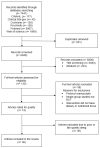Improving Obesogenic Dietary Behaviors among Adolescents: A Systematic Review of Randomized Controlled Trials
- PMID: 36364855
- PMCID: PMC9653747
- DOI: 10.3390/nu14214592
Improving Obesogenic Dietary Behaviors among Adolescents: A Systematic Review of Randomized Controlled Trials
Abstract
The overweight and obesity epidemic persists, and over 340 million children and adolescents aged 5-19 were classified as overweight or obese worldwide in 2020. Obesity intervention becomes crucial during the adolescent years due to the increased autonomy and adolescent motivation to oversee one's own behaviors and lifestyle-related decisions. The objective of the current study was to conduct a systematic review of randomized controlled trials aimed at improving dietary intake and behaviors among adolescents. The Preferred Reporting Items for Systematic Reviews and Meta-Analysis (PRISMA) guidelines were utilized. The key terms used in the searches referred to the study population and the topic of interest and included words and phrases such as "obesity or overweight and adolescents", "dietary behaviors and adolescents", "dietary intake and adolescents", and "dietary habits and adolescents." A tertiary screening process was employed, and the National Heart, Lung, and Blood Institute Quality Assessment of Controlled Intervention Studies quality scoring tool was utilized to assess the quality of research articles independently by n = 2 researchers. A total of 7441 articles were identified through the database search, and 36 were included in the current systematic review. The most common outcomes explored included dietary behaviors, anthropometric or biometric outcomes, and physical activity. Approximately half of the studies demonstrated significant improvements in the primary outcomes investigated. The majority of the high-impact studies where significant improvements in primary outcomes were demonstrated were conducted in school settings or were multicomponent or multilevel in nature. Thus, interventions targeting dietary behaviors in adolescents that are delivered in the school setting and are multicomponent or multilevel in nature are the most effective in terms of impact on dietary intake, anthropometric or biometric outcomes, and physical activity.
Keywords: adolescent; dietary behaviors; dietary intake; obesogenic.
Conflict of interest statement
The authors declare no conflict of interest.
References
-
- World Health Organization Overweight and Obesity 2021. [(accessed on 15 August 2022)]. Available online: https://www.who.int/news-room/fact-sheets/detail/obesity-and-overweight.
-
- Jelalian E., Jandasek B., Wolff J.C., Seaboyer L.M., Jones R.N., Spirito A. Cognitive-Behavioral Therapy Plus Healthy Lifestyle Enhancement for Depressed, Overweight/Obese Adolescents: Results of a Pilot Trial. J. Clin. Child Adolesc. Psychol. 2019;48:S24–S33. doi: 10.1080/15374416.2016.1163705. - DOI - PMC - PubMed
-
- Shomaker L.B., Berman Z., Burke M., Annameier S.K., Pivarunas B., Sanchez N., Smith A.D., Hendrich S., Riggs N.R., Legget K.T., et al. Mindfulness-based group intervention in adolescents at-risk for excess weight gain: A randomized controlled pilot study. Appetite. 2019;140:213–222. doi: 10.1016/j.appet.2019.05.022. - DOI - PMC - PubMed
Publication types
MeSH terms
LinkOut - more resources
Full Text Sources
Medical


